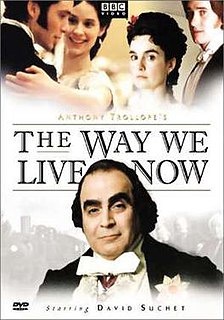
Anthony Trollope was an English novelist of the Victorian era. Among his best-known works is a series of novels collectively known as the Chronicles of Barsetshire, which revolves around the imaginary county of Barsetshire. He also wrote novels on political, social, and gender issues, and other topical matters.
Andrew Wynford Davies is a Welsh writer of screenplays and novels, best known for House of Cards and A Very Peculiar Practice, and his adaptations of Vanity Fair, Pride and Prejudice, Middlemarch, and War & Peace. He was made a BAFTA Fellow in 2002.
A miniseries is a television program that tells a story in a predetermined, limited number of episodes. The term "serial" is used in the United Kingdom and in other Commonwealth nations, though its meaning does not necessary equate to "miniseries" in its usage.

The Secret Garden is a novel by Frances Hodgson Burnett first published in book form in 1911 following the publication in 1910 of a serial version in a US magazine. Set in England, it is one of Burnett's most popular novels and is considered a classic of English children's literature. Several stage and film adaptations have been made.

Thomas Nigel Kneale was a British screenwriter. He wrote professionally for more than 50 years, was a winner of the Somerset Maugham Award, and was twice nominated for the BAFTA Award for Best British Screenplay. In 2000, he received the Lifetime Achievement Award from the Horror Writers Association.

Joanna Trollope is an English writer. She has also written under the pseudonym of Caroline Harvey. Her novel Parson Harding's Daughter won in 1980 the Romantic Novel of the Year Award by the Romantic Novelists' Association.

Rudolph Cartier was an Austrian television director, filmmaker, screenwriter and producer who worked predominantly in British television, exclusively for the BBC. He is best known for his 1950s collaborations with screenwriter Nigel Kneale, most notably the Quatermass serials and their 1954 adaptation of George Orwell's dystopian novel Nineteen Eighty-Four.
A hack writer is a pejorative term for a writer who is paid to write low-quality, rushed articles or books "to order", often with a short deadline. In a fiction-writing a hack writer is paid to quickly write sensational, "pulp" fiction such as "true crime" novels or "bodice ripping" paperbacks. In journalism, a hack writer is deemed to operate as a "mercenary" or "pen for hire", expressing their client's political opinions in pamphlets or newspaper articles. Hack writers are usually paid by the number of words in their book or article; as a result, hack writing has a reputation for quantity taking precedence over quality.
"The Way We Live Now" is a short story by Susan Sontag which was published to great acclaim on November 24, 1986 in The New Yorker. The story describes the beginnings of the AIDS crisis in the early 1980s, as the disease began to claim members of the New York cultural elite.

The Pallisers is a 1974 BBC television adaptation of Anthony Trollope's Palliser novels. Set in Victorian era England with a backdrop of parliamentary life, Simon Raven's dramatisation covers six of Anthony Trollope's novels and follows the events of the characters over two decades.
Vanity Fair may refer to:

Brideshead Revisited is a 1981 British television serial starring Jeremy Irons and Anthony Andrews. It was produced by Granada Television for broadcast by the ITV network. Most of the serial was directed by Charles Sturridge; a few sequences were directed by Michael Lindsay-Hogg.
Nigel Stafford-Clark is a British film and television producer, and the brother of the theatre director Max Stafford-Clark. He was educated at Felsted and Trinity College, Cambridge, and worked in advertising and in sponsored documentaries before becoming a commercials producer at Moving Picture Company (MPC).
The Way We Live Right Now was a BBC Radio Four adaptation of the Anthony Trollope novel The Way We Live Now, re-setting it in the present day. It was written by Jonathan Myerson for the Woman's Hour serial.
The American Senator is a novel written in 1875 by Anthony Trollope. Although not one of Trollope's better-known works, it is notable for its depictions of rural English life and for its many detailed fox hunting scenes. In its anti-heroine, Arabella Trefoil, it presents a scathing but ultimately sympathetic portrayal of a woman who has abandoned virtually all scruples in her quest for a husband. Through the eponymous Senator, Trollope offers comments on the irrational aspects of English life.
David Spenser was a Sri Lankan-born British actor, director, producer and writer. Spenser played the title role in a 1948 radio production of Richmal Crompton's Just William, and also appeared in popular films and TV series including Doctor Who. His documentary about Gwen Ffrangcon-Davies won an International Emmy Award. He was the elder brother of actor Jeremy Spenser.

Rachel Ray is an 1863 novel by Anthony Trollope. It recounts the story of a young woman who is forced to give up her fiancé because of baseless suspicions directed toward him by the members of her community, including her sister and the pastors of the two churches attended by her sister and mother.
This page is based on this
Wikipedia article Text is available under the
CC BY-SA 4.0 license; additional terms may apply.
Images, videos and audio are available under their respective licenses.









